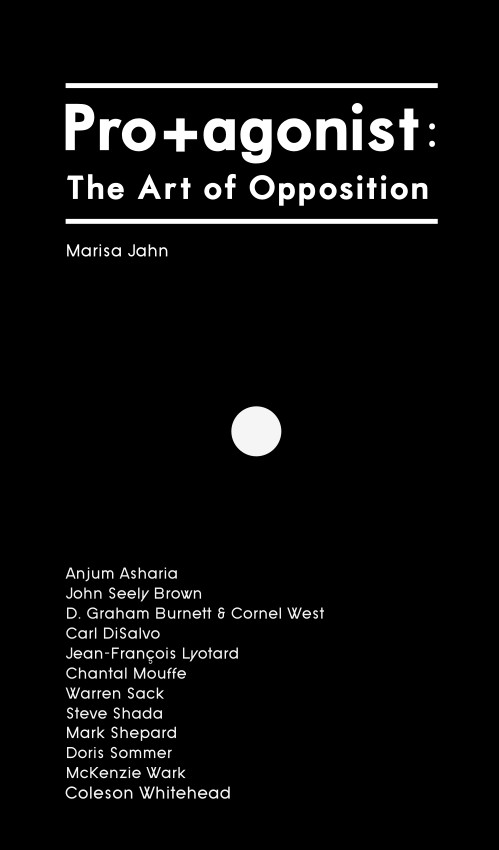Marisa Jahn (ed.): Pro+agonist: The Art of Opposition (2012)
Filed under book | Tags: · activism, agonism, art, gaming, performance, politics, protest

“This is a book and set of playing cards that explore the productive possibilities of ‘agonism,’ or a relationship built on mutual incitement and struggle. Designed in black and blue — the colors of a good bruise — Pro+agonist brings together writings by interdisciplinary artists, scientists, CEO’s, crackpots, war strategists, psychotherapists, and philosophers who raise questions about the importance of political dissent, the function of discord in discourse, the rules of escalating conflict, the roles of parasites within systems, the ins and outs of concord and congress, and more. The book’s introduction, written as a disagreement between a cast of fictional characters, is (arguably) more stimulating than if it were written from a single, unified perspective. Readers will emerge with a greater appreciation for duking it out and taking it to the streets.
p.s. – There’s a half-inch hole running through the center of both the book and the playing cards so that you can peek through, frame the Other, and keep them with you as you read along.”
With texts by Anjum Asharia, John Seely Brown, D. Graham Burnett + Cornel West, Carl DiSalvo, Marisa Jahn, Jean-Francois Lyotard, Chantal Mouffe, Warren Sack, Steve Shada, Mark Shepard, Doris Sommer, McKenzie Wark, Coleson Whitehead
Pro+agonist was commissioned by Northern Lights.mn and Walker Art Center for the symposium Discourse and Discord: Architecture of Agonism from the Kitchen Table to the City Street.
Publisher Northern Lights.mn, Walker Art Center, & REV-, Spring 2012
ISBN 9780985185305
117 pages
via Inge Hoonte
PDF (updated on 2017-7-10)
Comment (0)Tom Apperley: Gaming Rhythms: Play and Counterplay from the Situated to the Global (2010)
Filed under book | Tags: · australia, computer games, everyday, game studies, gaming, life, venezuela

Global gaming networks are heterogenous collectives of localized practices, not unified commercial products. Shifting the analysis of digital games to local specificities that build and perform the global and general, Gaming Rhythms employs ethnographic work conducted in Venezuela and Australia to account for the material experiences of actual game players. This book explores the materiality of digital play across diverse locations and argues that the dynamic relation between the everyday life of the player and the experience of digital game play can only be understood by examining play-practices in their specific situations.
Publisher: Institute of Network Cultures, Amsterdam 2010
Theory on Demand series, No 6
ISBN: 978-90-816021-1-2
Licensed under the Creative Commons Attribution Noncommercial No Derivative Works 3.0 Netherlands License
Miguel Sicart: The Ethics of Computer Games (2009)
Filed under book | Tags: · computer games, ethics, game studies, gaming

Despite the emergence of computer games as a dominant cultural industry (and the accompanying emergence of computer games as the subject of scholarly research), we know little or nothing about the ethics of computer games. Considerations of the morality of computer games seldom go beyond intermittent portrayals of them in the mass media as training devices for teenage serial killers. In this first scholarly exploration of the subject, Miguel Sicart addresses broader issues about the ethics of games, the ethics of playing the games, and the ethical responsibilities of game designers. He argues that computer games are ethical objects, that computer game players are ethical agents, and that the ethics of computer games should be seen as a complex network of responsibilities and moral duties. Players should not be considered passive amoral creatures; they reflect, relate, and create with ethical minds. The games they play are ethical systems, with rules that create gameworlds with values at play.
Drawing on concepts from philosophy and game studies, Sicart proposes a framework for analyzing the ethics of computer games as both designed objects and player experiences. After presenting his core theoretical arguments and offering a general theory for understanding computer game ethics, Sicart offers case studies examining single-player games (using Bioshock as an example), multiplayer games (illustrated by Defcon), and online gameworlds (illustrated by World of Warcraft) from an ethical perspective. He explores issues raised by unethical content in computer games and its possible effect on players and offers a synthesis of design theory and ethics that could be used as both analytical tool and inspiration in the creation of ethical gameplay.
Publisher MIT Press, 2009
ISBN 0262012650, 9780262012652
Length 280 pages

